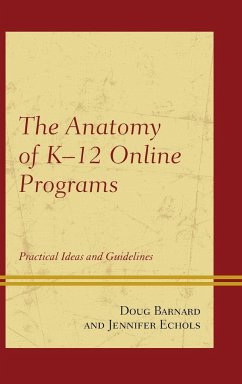- Gebundenes Buch
- Merkliste
- Auf die Merkliste
- Bewerten Bewerten
- Teilen
- Produkt teilen
- Produkterinnerung
- Produkterinnerung
The growth of virtual online programs at the K-12 level is unparalleled in the history of education. This book discusses what constitutes a viable online program and how programs maintain rigorous courses, creditability, and high academic standards.
Andere Kunden interessierten sich auch für
![Anatomy of K-12 Online Programs Anatomy of K-12 Online Programs]() Doug BarnardAnatomy of K-12 Online Programs34,99 €
Doug BarnardAnatomy of K-12 Online Programs34,99 €![A Treatise of Human Nature A Treatise of Human Nature]() David HumeA Treatise of Human Nature38,99 €
David HumeA Treatise of Human Nature38,99 €![Elementary Anatomy And Physiology Elementary Anatomy And Physiology]() Edward HitchcockElementary Anatomy And Physiology37,99 €
Edward HitchcockElementary Anatomy And Physiology37,99 €![Lucha Libre: Anatomy / Anatomía Lucha Libre: Anatomy / Anatomía]() Patty RodriguezLucha Libre: Anatomy / Anatomía9,49 €
Patty RodriguezLucha Libre: Anatomy / Anatomía9,49 €![A Text-Book of Physiology: For Medical Students and Physicians A Text-Book of Physiology: For Medical Students and Physicians]() William Henry HowellA Text-Book of Physiology: For Medical Students and Physicians47,99 €
William Henry HowellA Text-Book of Physiology: For Medical Students and Physicians47,99 €![Applied Anatomy and Kinesiology; the Mechanism of Muscular Movement. Illustrated With 189 Engravings Applied Anatomy and Kinesiology; the Mechanism of Muscular Movement. Illustrated With 189 Engravings]() Wilbur Pardon BowenApplied Anatomy and Kinesiology; the Mechanism of Muscular Movement. Illustrated With 189 Engravings32,99 €
Wilbur Pardon BowenApplied Anatomy and Kinesiology; the Mechanism of Muscular Movement. Illustrated With 189 Engravings32,99 €![Anatomy and Physiology Anatomy and Physiology]() Vijay Singh ChaudharyAnatomy and Physiology27,99 €
Vijay Singh ChaudharyAnatomy and Physiology27,99 €-
-
-
The growth of virtual online programs at the K-12 level is unparalleled in the history of education. This book discusses what constitutes a viable online program and how programs maintain rigorous courses, creditability, and high academic standards.
Produktdetails
- Produktdetails
- Verlag: Rowman & Littlefield Publishers
- Seitenzahl: 124
- Erscheinungstermin: 12. November 2014
- Englisch
- Abmessung: 235mm x 157mm x 12mm
- Gewicht: 342g
- ISBN-13: 9781475809817
- ISBN-10: 1475809816
- Artikelnr.: 41239827
- Herstellerkennzeichnung
- Libri GmbH
- Europaallee 1
- 36244 Bad Hersfeld
- gpsr@libri.de
- Verlag: Rowman & Littlefield Publishers
- Seitenzahl: 124
- Erscheinungstermin: 12. November 2014
- Englisch
- Abmessung: 235mm x 157mm x 12mm
- Gewicht: 342g
- ISBN-13: 9781475809817
- ISBN-10: 1475809816
- Artikelnr.: 41239827
- Herstellerkennzeichnung
- Libri GmbH
- Europaallee 1
- 36244 Bad Hersfeld
- gpsr@libri.de
Doug Barnard is recognized as being the founder of K-12 online programs in Arizona. The Arizona Republic newspaper has referred to him as the Dean of online programs in Arizona. Over thirty other Arizona school districts have signed agreements to use the K-12 online program developed by Dr. Barnard and his staff.
Preface
Acknowledgments
Introduction
Chapter 1: The Current Online Environment
Increasing enrollment in K-12 online programs
Common myths about online learning
Essential program components
Challenges facing online programs
The oversight of online programs
The politics of online learning
Chapter 2: Starting an Online Program
Vision, mission, and core beliefs
Identify the Defining Attributes
Hire the Staff
Awareness of critics
Selection of technology/vendors
Chapter 3: Curriculum
Options for curriculum
Standards-based curriculum
Grade-level appropriate
Chunked curriculum and frequent feedback
Flexibility and accessibility
Differentiating instruction for diverse learners
Chapter 4: The Potential Impact of the Common Core
The core of the Common Core
High stakes tests
The Common Core drives changes
Alignment of Common Core standards in online programs
Implications for lesson design in online programs
Options for K-12 online programs
The bottom line - increased cost
Is the Common Core here to stay?
Chapter 5: Academic Integrity
What is academic integrity?
Academic integrity builds credibility
Shifting societal view of cheating
The politics of cheating
Leadership from the state
How easy it is to cheat?
Ensuring academic integrity
Consequences for cheating
Removing the incentive to cheat
Chapter 6: Evaluating Online Teachers and Specialists
Expectations for online teachers
Feedback is important
Can feedback change online teacher behavior?
Evaluation of program specialists
Chapter 7: Technology, Monitoring & Functions
LMS options
Monitoring expectations
Other functions of the LMS
Chapter 8: Future Trends & Issues
Development and management of online courses
Statewide policies
Planning for school closures
Appendix A
Acknowledgments
Introduction
Chapter 1: The Current Online Environment
Increasing enrollment in K-12 online programs
Common myths about online learning
Essential program components
Challenges facing online programs
The oversight of online programs
The politics of online learning
Chapter 2: Starting an Online Program
Vision, mission, and core beliefs
Identify the Defining Attributes
Hire the Staff
Awareness of critics
Selection of technology/vendors
Chapter 3: Curriculum
Options for curriculum
Standards-based curriculum
Grade-level appropriate
Chunked curriculum and frequent feedback
Flexibility and accessibility
Differentiating instruction for diverse learners
Chapter 4: The Potential Impact of the Common Core
The core of the Common Core
High stakes tests
The Common Core drives changes
Alignment of Common Core standards in online programs
Implications for lesson design in online programs
Options for K-12 online programs
The bottom line - increased cost
Is the Common Core here to stay?
Chapter 5: Academic Integrity
What is academic integrity?
Academic integrity builds credibility
Shifting societal view of cheating
The politics of cheating
Leadership from the state
How easy it is to cheat?
Ensuring academic integrity
Consequences for cheating
Removing the incentive to cheat
Chapter 6: Evaluating Online Teachers and Specialists
Expectations for online teachers
Feedback is important
Can feedback change online teacher behavior?
Evaluation of program specialists
Chapter 7: Technology, Monitoring & Functions
LMS options
Monitoring expectations
Other functions of the LMS
Chapter 8: Future Trends & Issues
Development and management of online courses
Statewide policies
Planning for school closures
Appendix A
Preface
Acknowledgments
Introduction
Chapter 1: The Current Online Environment
Increasing enrollment in K-12 online programs
Common myths about online learning
Essential program components
Challenges facing online programs
The oversight of online programs
The politics of online learning
Chapter 2: Starting an Online Program
Vision, mission, and core beliefs
Identify the Defining Attributes
Hire the Staff
Awareness of critics
Selection of technology/vendors
Chapter 3: Curriculum
Options for curriculum
Standards-based curriculum
Grade-level appropriate
Chunked curriculum and frequent feedback
Flexibility and accessibility
Differentiating instruction for diverse learners
Chapter 4: The Potential Impact of the Common Core
The core of the Common Core
High stakes tests
The Common Core drives changes
Alignment of Common Core standards in online programs
Implications for lesson design in online programs
Options for K-12 online programs
The bottom line - increased cost
Is the Common Core here to stay?
Chapter 5: Academic Integrity
What is academic integrity?
Academic integrity builds credibility
Shifting societal view of cheating
The politics of cheating
Leadership from the state
How easy it is to cheat?
Ensuring academic integrity
Consequences for cheating
Removing the incentive to cheat
Chapter 6: Evaluating Online Teachers and Specialists
Expectations for online teachers
Feedback is important
Can feedback change online teacher behavior?
Evaluation of program specialists
Chapter 7: Technology, Monitoring & Functions
LMS options
Monitoring expectations
Other functions of the LMS
Chapter 8: Future Trends & Issues
Development and management of online courses
Statewide policies
Planning for school closures
Appendix A
Acknowledgments
Introduction
Chapter 1: The Current Online Environment
Increasing enrollment in K-12 online programs
Common myths about online learning
Essential program components
Challenges facing online programs
The oversight of online programs
The politics of online learning
Chapter 2: Starting an Online Program
Vision, mission, and core beliefs
Identify the Defining Attributes
Hire the Staff
Awareness of critics
Selection of technology/vendors
Chapter 3: Curriculum
Options for curriculum
Standards-based curriculum
Grade-level appropriate
Chunked curriculum and frequent feedback
Flexibility and accessibility
Differentiating instruction for diverse learners
Chapter 4: The Potential Impact of the Common Core
The core of the Common Core
High stakes tests
The Common Core drives changes
Alignment of Common Core standards in online programs
Implications for lesson design in online programs
Options for K-12 online programs
The bottom line - increased cost
Is the Common Core here to stay?
Chapter 5: Academic Integrity
What is academic integrity?
Academic integrity builds credibility
Shifting societal view of cheating
The politics of cheating
Leadership from the state
How easy it is to cheat?
Ensuring academic integrity
Consequences for cheating
Removing the incentive to cheat
Chapter 6: Evaluating Online Teachers and Specialists
Expectations for online teachers
Feedback is important
Can feedback change online teacher behavior?
Evaluation of program specialists
Chapter 7: Technology, Monitoring & Functions
LMS options
Monitoring expectations
Other functions of the LMS
Chapter 8: Future Trends & Issues
Development and management of online courses
Statewide policies
Planning for school closures
Appendix A









